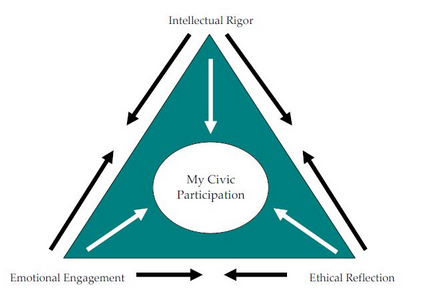“Aligning to the Common Core does not mean ignoring what we’re passionate about...The key is to do both: challenge our students to develop their literacy skills while examining difficult histories and issues of social justice.”
—Brittany L. Burns, Social Studies Teacher and Department Chair, Algonquin Regional High School, Northborough, MA
Social studies teacher Brittany Burns attended the first-ever Holocaust & Human Behavior seminar held in Denver a decade ago, and it transformed her practice. She recently adopted an innovative approach for aligning Facing History and Ourselves lessons with Common Core State Standards: she developed a Facing History unit using online curriculum development tools provided by our partner, Literacy Design Collaborative (LDC). LDC is a teacher-created instructional design system that aims to help educators meet college and career readiness standards.
To find out more about how teachers can take advantage of LDC’s tools and approach, you can register today for a free three-part webinar series that will introduce you to teaching strategies from Facing History’s Mini Task Collection, featured in the LDC’s CoreTools library.
We sat down with Brittany Burns to talk about how she meets standards while still covering topics that are ethically meaningful and why LDC’s tools are so effective for a Facing History classroom:
Facing History: Tell us about your background with Facing History. Why were you drawn to work with this organization?
I took my first seminar when I was student teaching ten years ago. Those five days were transformative for me. I knew that I really wanted to be a teacher and I knew that I loved working with kids, but I also felt like something was missing from history education. My week at that seminar showed me that what I was missing was the moral/ethical piece, that helps students become better human beings, not just more informed. I began incorporating Facing History into my very first classroom that fall. I have never been a Social Studies teacher without Facing History.
What are your goals for your students at the end of a Facing History un it?
it?
I really believe in Facing History’s pedagogical triangle. At the end of each of my units, my goal is that students have engaged in an academically rigorous curriculum that covers relevant content standards while also developing important skills, such as argumentative writing, primary source analysis, and problem solving. While those are the academic goals, it is also important to me that students connect emotionally to the content, so there is always an emphasis on individual stories and choices. Finally, students should be challenged ethically by the content, examining what these historical examples teach us about our own responsibility and decision-making.
How have you incorporated standards-based practices into your Facing History classroom?
The idea of “standards-based practices” really has to meld together with Facing History’s ethical approach. It is entirely possible, and I would argue completely necessary, for us to do so. We can focus on helping students develop the important higher-order thinking skills, while still using material and covering topics that are ethically meaningful.
What did the Literacy Design Collaborative's instructional design process add to your Facing History work?
The great thing about the Literacy Design Collaborative’s process is that it really helps you unpack the skills and examine your approach. It keeps the standards at the center, and it helped me make sure that my lessons were building toward my goal of developing students’ research and writing skills. Although it is a very prescriptive model, the process is useful in truly establishing backward design and helping you, the teacher, verify that your approach is actually leading your students to the intended goal.
What would be one recommendation you would give to a teacher aligning to Common Core?
I would tell teachers not to abandon what matters. Aligning to the Common Core does not mean abandoning what matters or ignoring what we’re passionate about. It’s an adjustment; a reminder to be more mindful when it comes to skill-building. The key is to do both, to challenge our students to develop their literacy skills while examining difficult histories and issues of social justice.
For example, I incorporate a lot of Common Core research and argumentative writing into my Holocaust course. In one project, students research an upstander who rescued or resisted during the Holocaust. Instead of writing a report on what they did, students research their story through primary documents and then write a paper on what motivates people to rescue or resist during times of crisis. They examine the conditions that allowed their person to stand up, and reflect on the barriers to upstanding.
A specific activity that really demonstrates this approach is the close viewing of the film “Pigeon,” a powerful 11-minute piece about one woman’s decision to save a Jewish stranger during the Holocaust. While the meat of the film is its ethical dilemma, it also provides an excellent opportunity to engage students in in-depth analysis. Students watch the film three to four times, each time observing and analyzing different aspects of the film, such as lighting, music, scenery, dialogue, etc. As they unpack the film and analyze its effectiveness at delivering the message, they also engage in a philosophical discussion of the characters’ actions and motivations. This activity helps them analyze evidence and use it to evaluate a source, as well as draw conclusions based on the evidence—key Common Core Standards and important historical thinking skills.
We can do both, and it’s so important that we remember that we need to do both. Our students must improve their skills while also examining the important questions of justice and morality that exist in history and the world around us.
You can register today for a free three-part webinar series, where we will introduce you to several teaching strategies from Facing History’s Mini Task Collection, featured in the LDC’s CoreTools library.
Check out Facing History’s close-viewing protocol here. Log in to the Facing History website to stream the “Pigeon” video and use it with your students. You can find many more Common Core-aligned resources, including Brittany’s unit exploring the Holocaust, at facinghistory.org/commoncore.


